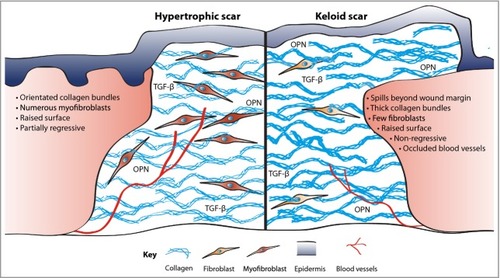Figure 3
- ID
- ZDB-FIG-190723-1846
- Publication
- Martin et al., 2015 - Cellular and molecular mechanisms of repair in acute and chronic wound healing
- Other Figures
- All Figure Page
- Back to All Figure Page
|
Excessive fibrosis. Scars, formed in part as a consequence of inflammatory signals, are comprised of collagen deposited in thick orientated bundles rather than the basket-weave-like fibrils found in normal dermis. Hypertrophic scars have excessive collagen deposition, leading to a raised surface that partially resolves over time. In contrast, keloid scars have thicker collagen bundles, extend beyond the original wound margin and rarely regress. Contractile myofibroblasts are prevalent in hypertrophic scarring but all but are absent in keloid tissue. Keloids can also be characterized by occluded blood vessels. OPN, osteopontin; TGF-β, transforming growth factor-β. |

